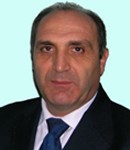
Plenary Lecture
Smart Grids and Building Automation

Professor Francesco Muzi
Department of Electrical and Information Engineering
University of L’Aquila
Italy
E-mail: francesco.muzi@univaq.it
Abstract: The electricity networks of the future, also named smart grids, are rapidly growing in order to satisfy a number of needs that traditional electric distribution systems cannot assure. Among the main challenges that smart grids allow to overcome, there is the possibility to respond to the increasing demand for electrical energy using profitably energy from renewable sources dispersed on the territory, otherwise hard to exploit, and at the same time improving efficiency in distribution and consumption. Another important issue is the capability to optimize the operation of storage systems both to shave power peaks and to promote the development of electric vehicles. Smart grids have to carry out these complex functions with high reliability, energy sustainability and security levels, taking also into account energy real-time prices. In order to reach these goals, it is necessary to introduce a massive use of advanced systems of monitoring, control and ICT (Information and Communication Technologies) that have already produced a first evolution of distribution networks and liberalised the global electricity market, allowing at the same time a more active role of the end user - also named “prosumer” (producer and consumer of energy). On the basis of the operating conditions of each network and the actual cost of kWh, a prosumer will have to decide the right amount of energy that must be acquired, produced, consumed and stored. It is quite clear that in the near future the cooperation between smart grid operators and “prosumers” will become more and more important. From this point of view, each “prosumer-node”, materialized by a smart building, in addition to allowing energy exchange, will also have to allow an information exchange with the control system of the entire network in order to establish full-duplex communications not only with the central nodes, but with other prosumer-nodes as well. On the other hand, the power peaks of one prosumer-node could be compensated by the intervention of neighboring nodes in a global market context of energy buying and selling. All this will result in a significant improvement of overall energy efficiency that will strongly involve the end user, that will become more "active" in terms of both exchanged energy and decision making processes.
Brief Biography of the Speaker: Francesco Muzi is a professor of Power Systems at the University of L’Aquila, Italy, where he has also the scientific responsibility for the Power System Group. His main research interests concern Power systems transients and dynamics, Reliability and power quality in distribution systems, Power systems diagnostics and protection. In these fields, he authored or co-authored over 100 scientific papers published in reviewed journals or presented at international conferences. He received mentions in books edited by John Wiley & Sons, New York and participated to the outline of the “IEEE Guide for improving the lightning performance of electric lines”, IEEE Standards Department, New York. He has also a patent for an industrial invention, namely “Power system controlled by a microprocessor”. He is a regional chairman of the Italian National Lighting Society and was a chairman or keynote lecturer in a number of international conferences organized by different prestigious societies. He is a technical reviewer for the following international journals: IEEE Transactions on Power Delivery, Electric Power Systems Research by Elsevier Science, IET Generation, Transmission & Distribution.